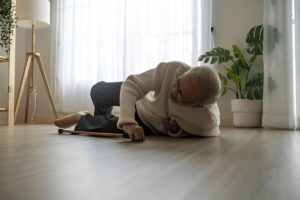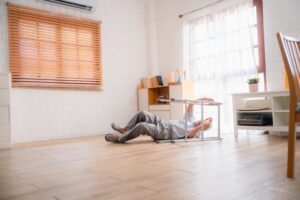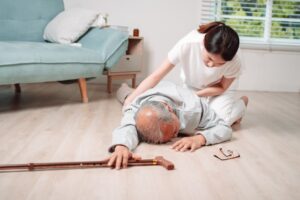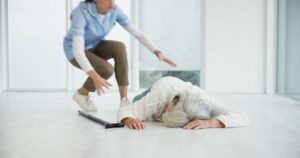What to Look for in a Fall Prevention Plan at Nursing Homes
Nursing Home AbuseFalls are one of the leading causes of serious injuries in nursing homes, and many are preventable with a proper fall prevention plan. When facilities fail to implement or follow effective safety measures, residents can suffer broken bones, head injuries, or even life-threatening complications.
These incidents often result from understaffing, poor supervision, or outdated protocols. Injured victims find it difficult to prove that a faulty fall prevention plan caused harm, especially when nursing homes try to shift blame or hide evidence.
A nursing home abuse lawyer can investigate the incident, review facility policies, and hold the negligent parties accountable. By building a strong case, they can help secure compensation for injury-related losses while pushing for safer conditions.
Key Takeaways
- Falls in nursing homes are often preventable with proper safety measures.
- Understaffing, poor supervision, and outdated protocols increase fall risks.
- Injuries from falls can lead to high medical costs, long-term care needs, and emotional distress.
- Proving negligence can be challenging without substantial evidence and legal support.
- A nursing home abuse lawyer can investigate, preserve evidence, and fight for fair compensation.
- Legal action helps cover losses and encourages safer conditions for all residents.
- Call a nursing home abuse attorney if a loved one suffers an injury in a nursing home fall accident.
Nursing Home Fall Prevention Strategies
Falls are serious safety concerns in nursing home settings, with potentially devastating consequences for elderly residents. Effective fall prevention requires a comprehensive approach addressing environmental hazards and individual risk factors.
Environmental Modifications
 Nursing homes must maintain safe physical environments through proper lighting, non-slip flooring, and strategically placed grab bars in bathrooms and hallways. Clutter-free walkways, secure handrails, and appropriate furniture height reduce trip hazards.
Nursing homes must maintain safe physical environments through proper lighting, non-slip flooring, and strategically placed grab bars in bathrooms and hallways. Clutter-free walkways, secure handrails, and appropriate furniture height reduce trip hazards.
Regular facility inspections identify and address potential dangers like loose carpeting, inadequate lighting, or improperly maintained equipment.
Individual Risk Assessment
Staff should conduct thorough fall risk assessments for each resident, evaluating factors like medication effects, mobility limitations, cognitive impairment, and previous fall history.
The assessment process includes personalized prevention plans, including specialized footwear, assistive devices, or modified room arrangements to accommodate specific needs.
Staff Training and Supervision
Proper staff training ensures employees recognize fall risks and respond appropriately. Staff members should undergo training on medication side effects that increase fall risk, adequate transfer techniques, and how to respond promptly to call bells.
Adequate staffing levels allow for appropriate supervision of high-risk residents.
Medication Management
Many medications contribute to fall risk through side effects like dizziness, confusion, or sedation. Regular medication reviews with healthcare providers can identify and minimize these risks through dosage adjustments or alternative treatments.
Physical Therapy and Exercise Programs
Structured exercise programs help residents maintain strength, balance, and coordination. Physical therapy addresses mobility issues and teaches safe movement techniques, while occupational therapy helps residents adapt to physical limitations.
Family Involvement
Families also contribute to fall prevention by communicating changes in their loved one’s condition. They can also advocate for appropriate care and understand the facility’s prevention strategies to support consistency across care settings.
What to Do if Someone Falls in a Care Home
 When a loved one falls in a care home, your immediate response can enhance their health outcomes and protect their legal rights. Falls in care facilities often result in serious injuries, so prompt action is invaluable.
When a loved one falls in a care home, your immediate response can enhance their health outcomes and protect their legal rights. Falls in care facilities often result in serious injuries, so prompt action is invaluable.
Seek Immediate Medical Attention
Your priority must be ensuring your loved one receives a prompt, thorough medical evaluation. Even if the fall appears minor, elderly residents face higher risks of complications due to fragile bones, blood-thinning medications, and underlying health conditions.
Demand that facility staff call for emergency medical services or arrange immediate transport to a hospital for a comprehensive examination.
Don’t accept staff reassurances without an evaluation from a healthcare provider. Hidden injuries like concussions, internal bleeding, or hairline fractures may not show immediate symptoms but can become life-threatening without treatment.
Insist on diagnostic imaging such as X-rays or CT scans if there’s any possibility of head injury or fractures. Document all medical findings and keep copies of hospital records, as these can be sources of evidence during legal proceedings.
You should also follow up with your loved one’s primary physician to ensure continuity of care and monitor for delayed complications that sometimes emerge days after a fall.
Report the Incident Properly
While the care home has legal obligations to report falls, you should also file your incident report to create an independent record. Contact the facility administrator immediately to document the details of the fall, including the time, location, contributing factors, and any witnesses present.
Request a copy of the facility’s incident report and review it for accuracy. If you notice discrepancies or omitted details, insist on corrections.
Many facilities attempt to downplay incidents or attribute falls to resident behavior rather than acknowledging systemic failures like inadequate supervision, environmental hazards, or medication errors.
Report the incident to your state’s long-term care ombudsman program and relevant licensing agencies. These agencies investigate care home negligence and can identify patterns of poor care that may affect other residents.
Consult a Nursing Home Abuse Lawyer
Contact an experienced nursing home abuse attorney as soon as possible after the fall. Many falls result from preventable negligence, including inadequate staffing, improper medication management, failure to use safety equipment, or ignoring known fall risks.
A nursing home abuse lawyer can evaluate whether the facility breached its duty of care and determine if you have grounds for a legal claim.
Legal representation becomes particularly important because care facilities often have teams of lawyers working to minimize their liability. A nursing home abuse attorney will preserve evidence, interview witnesses before memories fade, and ensure proper documentation of the damages.
They can also communicate with insurance companies on your behalf, preventing you from inadvertently compromising your legal rights.
Time limits apply to nursing home negligence claims. A nursing home abuse attorney understands the applicable timelines and deadlines and will initiate a timely claim so you don’t lose your right to compensation.
Can I Sue a Nursing Home for Injury
If you or a loved one has suffered an injury in a nursing home, you may wonder if you have legal grounds to take action against the facility. Here are some reasons why you may have a valid case to sue a nursing home for injury:
- Reduced Quality of Life: A serious injury can impact your quality of life, leading to physical pain, emotional distress, and financial burdens. By holding the nursing home accountable for the harm caused, you can seek compensation to help improve your overall well-being.
- Negligence and Unsafe Practices: Nursing homes must provide residents with a safe and conducive environment. If the facility fails to uphold this duty by engaging in negligent or unsafe practices that result in an injury, you have the right to pursue legal action to seek justice.
- Denial of Liability: Nursing homes may try to deny responsibility for an injury, shifting blame onto the victim or claiming that the incident was unavoidable. By filing a lawsuit, you can challenge these denial tactics and ensure the facility compensates you for the losses.
- Defense Strategies: Some nursing homes may use defense strategies to shift blame away from their negligence. A skilled nursing home abuse attorney can file a lawsuit to counter these tactics in court and protect your legal right to compensation.
- Low Settlement Offers: Insurance companies representing nursing homes may offer unfairly low settlement amounts, hoping you’ll accept and move on. An experienced nursing home abuse attorney can help negotiate a fair and just settlement that adequately compensates you for your damages.
How Much Can You Sue a Nursing Home for Negligence
 The amount you can sue for nursing home negligence varies, ranging from tens of thousands to millions of dollars. Compensation for nursing home lawsuits covers economic, non-economic, and sometimes punitive damages.
The amount you can sue for nursing home negligence varies, ranging from tens of thousands to millions of dollars. Compensation for nursing home lawsuits covers economic, non-economic, and sometimes punitive damages.
Here are the factors that influence how much you can sue for negligence:
- Severity of Harm: The extent of the harm caused by the nursing home’s negligence can determine if you’ll receive a higher or lower settlement value. Severe injuries or conditions resulting from neglectful actions or practices can lead to higher damages awarded in a lawsuit.
- Quality of Life Impacts: In cases where negligence has profoundly impacted the resident’s quality of life, the compensation sought in a lawsuit may increase. Factors such as loss of independence, emotional distress, and deterioration in overall well-being can contribute to a higher settlement value.
- Facility Resources: The resources and assets of the nursing home facility can also affect the amount you can receive in the lawsuit. A facility with substantial financial resources can pay higher damages than one with limited resources. A facility with financial muscle is also willing to hire a defense attorney who can work to minimize your compensation.
- Availability of Evidence: The strength of the evidence supporting your claim is the foundation for a successful negligence lawsuit. Clear documentation, witness statements, and any other relevant evidence can enhance the value of your lawsuit. A well-supported case is more likely to result in a favorable outcome.
- Quality of Legal Representation: Having skilled and experienced legal representation is key to maximizing compensation in a negligence case against a nursing home. A knowledgeable nursing home abuse attorney has networks in the court system, can build a strong case on your behalf, and advocate for your rights. The quality of your legal representation can ultimately influence the outcome of the lawsuit in your favor.
How Long Does a Nursing Home Lawsuit Take
Nursing home lawsuits typically take 1-3 years to resolve, though complex cases can extend longer. Simple cases with clear liability and cooperative defendants may settle within 6-12 months, while disputed cases requiring trial can take 3-5 years.
Here are the factors that influence the timeline:
- Case complexity: Multiple defendants or severe fall injuries extend timelines.
- Severity of damages: Higher-value cases face more resistance, which can lead to delays.
- Discovery process: Gathering medical records, depositions, and expert testimony takes months.
- Settlement negotiations: Willing parties settle faster than those fighting liability.
- Court schedules: Busy dockets can delay hearings and trials.
- Appeal potential: Large verdicts often face appeals, adding 1-2 additional years.
Partner With an Attorney to Demand Justice for Your Loved One
 A fall injury in a nursing home can leave residents facing overwhelming financial challenges, from costly medical treatments and rehabilitation to the need for ongoing care. These expenses often burden families, especially when the injury was preventable and caused by a faulty fall prevention plan.
A fall injury in a nursing home can leave residents facing overwhelming financial challenges, from costly medical treatments and rehabilitation to the need for ongoing care. These expenses often burden families, especially when the injury was preventable and caused by a faulty fall prevention plan.
Pursuing justice can be challenging without experienced legal guidance, especially when facilities try to avoid responsibility. A nursing home abuse lawyer can investigate the incident, gather evidence of negligence, and build a strong case on your behalf.
You can hold the facility accountable with skilled representation and push for a fair settlement value that fully covers your economic and non-economic damages.
Contact a nursing home abuse lawyer for legal guidance if a loved one sustains an injury due to a faulty fall prevention plan.
Frequently Asked Questions
How Do I Prove the Nursing Home Was at Fault for the Fall?
You need evidence showing they breached their duty of care. Key sources of evidence include facility incident reports, medical records documenting injuries, and witness statements from staff or residents.
A nursing home abuse attorney can also use maintenance records showing unsafe conditions, staffing schedules revealing inadequate supervision, and expert testimony establishing how the facility’s negligence caused the fall.
What Should I Look for in a Nursing Home Abuse Lawyer?
Look for an attorney with specific nursing home abuse experience, a proven track record of successful settlements and verdicts.
Choose lawyers who offer free consultations, work on contingency fees, have trial experience, and maintain good standing with state bars. They should also demonstrate compassion while communicating the case’s potential outcomes.
What if the Nursing Home Claims the Fall Was Unavoidable?
Nursing homes often claim falls were “unavoidable” to avoid liability, but this defense rarely holds up with a proper investigation.
An experienced nursing home abuse attorney can examine whether the facility conducted proper risk assessments and implemented appropriate safety measures. Most falls result from preventable negligence, not unavoidable accidents.
Nathan Hughey, an attorney and fourth-generation South Carolinian, founded Hughey Law Firm in 2007. Before that, he spent five years defending nursing homes and insurance companies. Leveraging his experience, he now advocates for those injured or wronged by such entities, securing over $290 million in verdicts and settlements.
